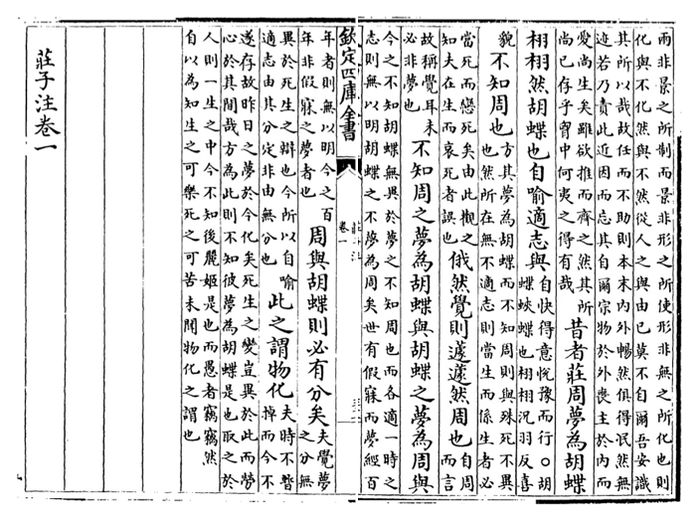"(Translation) 蝴蝶夢"의 두 판 사이의 차이
(→Translation) |
(→Student Translation : Jelena Gledić) |
||
| 37번째 줄: | 37번째 줄: | ||
+ A usual translation of 物化 is 'transformation of things' but "becoming/transforming into a thing" is quite appropriate here. | + A usual translation of 物化 is 'transformation of things' but "becoming/transforming into a thing" is quite appropriate here. | ||
| − | + | (Fran): The transition from talking about Zhuang Zhou in the third person to the first person voice in the third sentence might be confusing to some readers. I might render the first sentence into: "Once I, Zhuang Zhou, dreamed of being a butterfly." I'm curious about your line, "This is called becoming a thing," though I suspect this would take us down the rabbit hole of interpreting Zhuangzi's philosophy! | |
[[Category:2018 Hanmun Summer Workshop]] | [[Category:2018 Hanmun Summer Workshop]] | ||
[[Category:Intermediate Training Group]] | [[Category:Intermediate Training Group]] | ||
2018년 7월 12일 (목) 19:43 판
| Primary Source | ||
|---|---|---|
 |
Title | |
| English | Butterfly dream | |
| Chinese | 蝴蝶夢(Hudie meng) | |
| Korean(RR) | 호접몽 | |
| Text Details | ||
| Genre | ||
| Type | ||
| Author(s) | Zhuangzi 莊子 | |
| Year | ||
| Source | ||
| Key Concepts | ||
| Translation Info | ||
| Translator(s) | Participants of 2018 Hanmun Summer Workshop (Intermediate Training Group) | |
| Editor(s) | ||
| Year | 2018 | |
Original Script
Translation
Student Translation : Jelena Gledić
Once Zhuang Zhou dreamed of being a butterfly. The butterfly was vivid and joyous, content and at ease. I did not know of Zhou. Suddenly I was awake, and apparently, I was Zhou. I did not know if Zhou dreamed of being a butterfly, or the butterfly was dreaming of being Zhou. Zhou and the butterfly, they must be differentiated. This is called becoming a thing. “Zhuangzi – On the uniformity of things”
- Discussion Questions:
+ I found a brief but very good (and in line with my view :)) discussion on the sentence 不知周也 in Chong, Kim-chong. Zhuangzi's Critique of the Confucians: Blinded by the Human, SUNY Press, 2016, page 46. The author translated it even more vaguely in an attempt to keep the plurality of interpretations of the original: "No awareness of Zhou."
(YO) Right. If we say "I did not know I was Zhou", then it would presuppose that I be Zhou as a fact.
+ (YO) 栩栩然胡蝶也 is an emphatic pattern, so: "Vivid and joyous was the butterfly, content and at ease, unaware of Zhou!"
+ A usual translation of 物化 is 'transformation of things' but "becoming/transforming into a thing" is quite appropriate here.
(Fran): The transition from talking about Zhuang Zhou in the third person to the first person voice in the third sentence might be confusing to some readers. I might render the first sentence into: "Once I, Zhuang Zhou, dreamed of being a butterfly." I'm curious about your line, "This is called becoming a thing," though I suspect this would take us down the rabbit hole of interpreting Zhuangzi's philosophy!